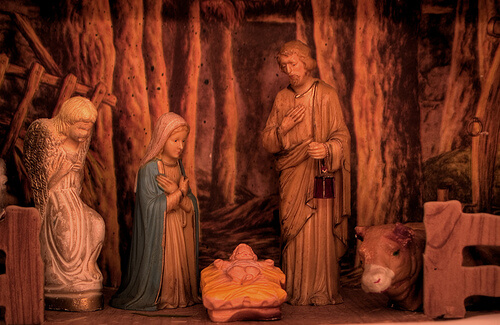
John 1:1-3, 14, 18
Since I was a boy I have loved the play “Green Pastures”, by Pulitzer Prize winning playwright Marc Connelly. In the play Connelly spins wondrous tales from the Bible as seen through the eyes of a young African-American growing up during the depths of the Great Depression.
In one particular moving scene of the play, the Lord God is looking out over the parapets of heaven trying to decide what to do with His rebellious children down on earth. Even the angels are exasperated with the way Adam’s race is behaving, with one of them complaining that “Everything nailed down is coming loose.”
The angel Gabriel enters stage right, moistening his lips, ready to blow the trumpet and bring the world to an end. “Now Lord?” Gabriel pleads with God, “Now can I blow the trumpet?” Patiently the Lord replies, “No, not yet Gabriel. Put your trumpet away.”
Gabriel asks the Lord what He’s going to do about the trouble that His people are in. Will God perhaps send someone to take care of it? “How about another David or Moses” Gabriel suggests. “You could send one of the prophets, Isaiah or Jeremiah. There are lots of prophets up here, Lord.”
But the Lord pauses, thinks for a moment, then looking Gabriel in the eye says: “I’m not going to send anyone. This time I am going myself!”
And that is what we celebrate at Christmas! That it was God Himself who has come to help us. Not an angel or archangel, but God Himself. The eternal God so loved us that He forever clothed Himself in our humanity and took up our cause.
Notice that today’s Scripture text is painstakingly precise in describing the Incarnation, or God becoming human. When the text says that God became “flesh”, it uses a Greek word that describes far more than just human skin, or our physical body. It is a word encompassing all that it means to be human, human in all our struggles and pain. “The Word became flesh”. The infinite, eternal, unbounded God took on our full human condition, except for sin. St. Augustine said it well: “He put on what He was not, without losing what He was.”
The Bible is as clear about Christ’s full deity as it is clear about His full humanity. The Son of God really did become human. He is truly God-with-us, Immanuel. In Him we see the glory of God. He who spoke a word commanding the heavens and earth to come forth, has Himself come down to us. He made Himself vulnerable to float helplessly in a womb, struggle through the birth canal to draw mortal breath, bound in strips of cloth and laid in a feeding trough for cattle. And all because He loves us!
Our text declares: “We have seen His glory, the glory as of a father’s only son, full of grace and truth”. It is a fascinating and significant Greek word that is translated by our English phrase, “a father’s only son”. It is the Greek word, monogenes. The first part of the word is mono, which means “one”; the second part, genes, is the word from which we get “gene” and “genetic”. In today’s language we could translate monogenes as “of one genes with the Father”. He is of the same genetic makeup or chromosomes as God the Father. He is of the same likeness and being as God. He is God with us!
I often look up at the stars at night and wonder what the infinite God must be like. Or, especially when I go through times of darkness, I wonder if the Almighty God could even care. Then I remember Jesus who is the revelation of what God is like. He is “full of grace and truth”. Jesus knows exactly what it is like for us to suffer, to feel the sting of rejection, to endure hardship and misunderstanding. I love how the old spiritual puts it: “Nobody knows the trouble I’ve seen, nobody knows but Jesus.”
We never have a problem but that Jesus feels it and understands. We don’t have a heartache but that Jesus takes it as His very own. Sometimes when I think God is somewhere far away, or that He might be put off with my struggling, I like to open the Bible to New Testament Book of Hebrews and ponder:
Now that we know what we have—Jesus, this great High Priest with ready access to God—let’s not let it slip through our fingers. We don’t have a priest who is out of touch with our reality. He’s been through weakness and testing, experienced it all—all but the sin. So let’s walk right up to him and get what he is so ready to give. Take the mercy, accept the help.
Hebrews 4:14-16, The Message
It is God Himself who has come down to us! “And the Word became flesh and lived among us.”
“Glory to God in the highest, and peace to His people on earth!”
Tim


